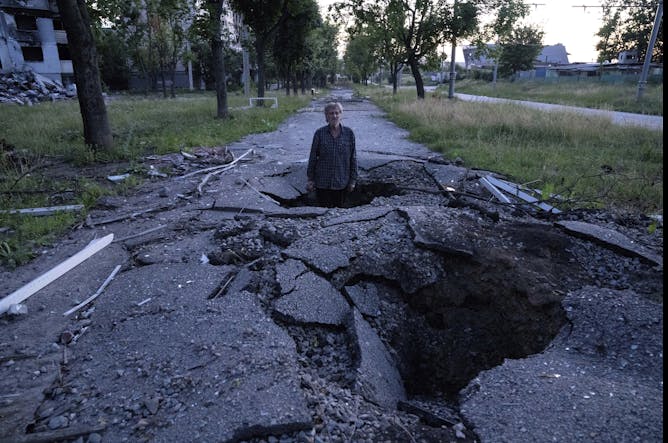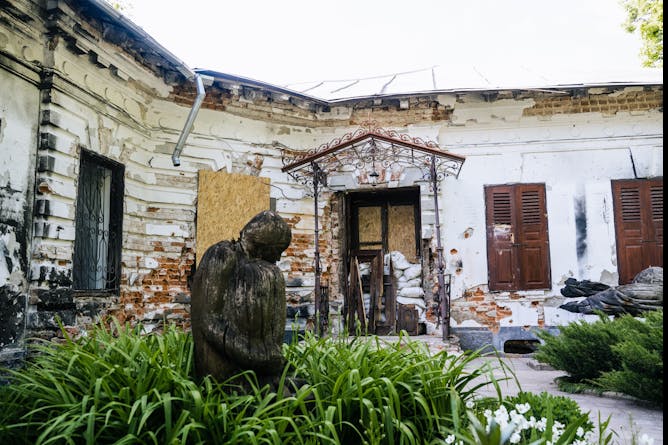|
The most recent season of Stranger Things has a subplot focused around a famed conspiracy of satanism tied to children playing Dungeons and Dragons in the 1980s. And it does a pretty good job mirroring the issues society is facing today regarding conspiracy theories — think micro-chipped vaccines or the fact some believe global leaders orchestrated the pandemic.
On the same weekend that the Season Four finale of Stranger Things was released, the so-called freedom convoy returned to Canada’s capital, reminding us of the conspiracy-fuelled event from February.
Today in The Conversation Canada, Scott DeJong from Concordia University says Stranger Things shows how easily people are influenced when they’re clamouring for answers during times of uncertainty. He writes: “Before going full crusader for a worldview, let’s question the stranger things in life and seek to learn from them.”
Also today:
All the best,
|

A conspiracy theory is formed against Stranger Things character Eddie Munson.
(Stranger Things/Netflix)
Scott DeJong, Concordia University
Season Four of ‘Stranger Things’ shows how easily people are influenced when they’re clamouring for answers during times of uncertainty.
|

A man stands in a crater after a Russian attack in Kharkiv, Ukraine, on July 1, 2022.
(AP Photo/Evgeniy Maloletka)
David Carment, Carleton University; Dani Belo, Webster University
The EU must play the biggest role in ending the war in Ukraine. Peace negotiators should take a systematic approach that focuses first on where there is likely to be agreement.
|

A museum in Trostyanets, destroyed during the Russian military invasion of Ukraine.
(Shutterstock)
Aaron Mauro, Brock University
Cultural artifacts are at risk of destruction during war, but digital tools and platforms may help preserve their legacy.
|

Two-eared listening is a critical element for Western advocates of restorative justice.
(Shutterstock)
Chief Mi’sel Joe, Indigenous Knowledge; Dorothy Vaandering, Memorial University of Newfoundland; Rosemary Ricciardelli, Memorial University of Newfoundland; Sulaimon Giwa, Memorial University of Newfoundland; Sylvia Moore, Memorial University of Newfoundland
Two-eared listening is based on the idea of learning and understanding, a willingness to be suspend judgement and the desire to communicate respectfully.
|

Le jeûne intermittent pourrait avoir de nombreux avantages pour la santé, mais il n’existe pas encore d’étude sur ses effets à long terme.
neirfy/iStock via Getty Images Plus
McKale Montgomery, Oklahoma State University
Les partisans du jeûne intermittent affirment que l’horloge peut vous aider à gagner la bataille des bourrelets. Mais la science qui se cache derrière est un peu plus compliquée.
|
Ukraine Invasion
|
-
Jonathan Este, The Conversation
A digest of the week’s coverage of the war against Ukraine.
-
Matthew Sussex, Australian National University
This lull before the next phase of a long attritional campaign will be a test of Ukrainian resolve, Russia’s ability to resupply, and the West’s strategic patience.
|
|
COVID-19
|
-
Simon Kolstoe, University of Portsmouth
Given most countries have stopped requiring negative COVID tests to enter, can you just go? An ethicist weighs in.
|
|
Culture + Society
|
-
Monia Lachheb, Université de la Manouba
The first African player to reach a major tennis final, she has set Wimbledon – and Tunisian hearts – ablaze.
|
|
Politics
|
-
Hugo Dobson, University of Sheffield; Kristian Magnus Hauken, University of Sheffield
Shinzo Abe’s murder is the latest political attack in Japan, a country which has strict gun laws.
-
Garret Martin, American University School of International Service
The UK prime minister tendered his resignation after a slew of resignations by former allies in his government.
|
|